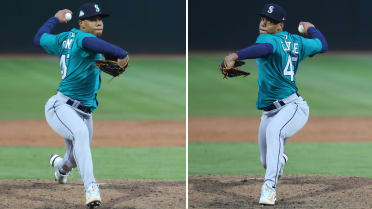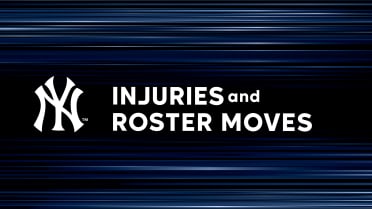Tunes a boon to Kapler's managing style
New Phils skipper enhancing mood, workouts with music; umpires attend camp
CLEARWATER, Fla. -- There is a small bluetooth speaker set up in the hallway outside Phillies manager Gabe Kapler's office at Spectrum Field.
It plays music softly throughout the day, filling an otherwise empty concrete passageway.
The music in the Phillies' clubhouse is louder. The music at Carpenter Complex, which also played last spring, is louder than that.
• Spring Training:Info | Tickets | Gear
Music has been a constant companion to the Phillies the first week of camp. That will not change.
"I believe strongly that mood is enhanced by music," Kapler said Friday. "One of the ways we decide on the music: We ask all our players, 'What do you like to listen to? What makes you feel strong during your workouts?' We ask them after the workouts. 'Hey, how was the music today? More volume? Less volume? Did you hear something that you liked?'
:: Spring Training coverage presented by Camping World ::
"When we're surrounded by music, we feel good. We smile more. When we smile more, we're more relaxed at the plate. There is science behind this. It's not a theory. It's been studied. Workplaces are happier and they're more inspired when music is playing."
Every type of music is represented.
"[A lack of variety] wouldn't appreciate the diversity we have on our roster and the diversity we have on our coaching staff," Kapler said. "We're not trying to cater to one individual. We're trying to cater to our environment."
Kapler said he comes from a musical family.
"My dad is a music teacher," Kapler said. "He is a classical musician. He's a piano teacher. He has written music. He's written children's music. My mom is an early childhood educator. I grew up with music in my house all the time. And if you ever come into my office, there will be music playing. In my home, I have music playing all the time. Mostly because it makes me feel strong."
And what is his type of music?
"If you come into my office, you might hear some John Lee Hooker or, early in the morning, some Norah Jones as I drink coffee," Kapler said. "It's eclectic."
Strike one!
The Phillies are seeking any available advantage, so on Friday, they turned to umpires for help.
They used umpires in their bullpen sessions to create more game-like conditions for their pitchers. It is the first time the Phillies have tried such a tactic -- and it is unclear if any other team has tried this -- but things are different this spring as Kapler seeks value at the margins.
"Craig Driver, in our catching department, was instrumental in suggesting how powerful that would be, to give feedback to the catchers on their ability to keep balls in the zone, to create more game-like conditions for the pitchers," Kapler said after Friday's workout at Carpenter Complex. "It's not the meat and the potatoes. Having umpires out there is not the most important thing. It's just, 'How can we find the last little detail that gets us a tiny bit better and gives us one step forward?' Look, we're trying to win 90-plus games. It's not going to be easy. It's going to take all of us coming together and thinking about how we can extract that last bit of value."
Kapler said pitchers and catchers were informed about umpires being behind the plate during Friday's pre-workout meeting. They were told it was optional. If they didn't want an umpire behind they plate, they didn't have to have one.
Nobody said no.
"It was definitely different, but I think it's the best way you can throw a bullpen [session] without a hitter stepping into the box," Aaron Nola said.
"We've gotten universally positive feedback on it," Kapler said. "That's not to say we'll always get the perfect feedback. That's not the most important thing. The most important thing is we share up front that we try new things and we iterate. We ask, 'How can we make this better?' Do we want to add batters to the batter's box to create an even more game-like look? Again, if we're including the players in their development and the staff members' opinions and we come to a consensus, then we go hammer it. We're bold about it. Then next day, we try to make it a little bit better."
Todd Zolecki has covered the Phillies since 2003, and for MLB.com since 2009. Follow him on Twitter and Facebook and listen to his podcast.



